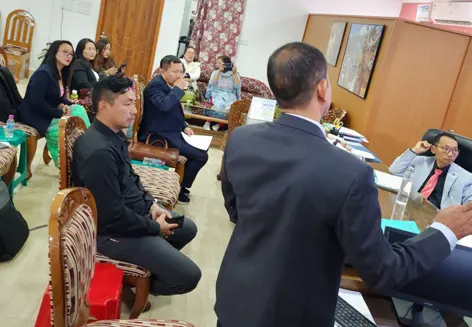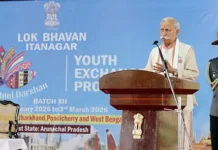ITANAGAR/YUPIA, 16 Jan: Itanagar Capital Region (ICR) District Leprosy Officer (DLO) Dr Dominic Lokham said that the nationwide Sparsh leprosy awareness campaign (SLAC), under the National Leprosy Eradication Programme (NLEP), was introduced on 30 January, 2017 (Anti-Leprosy Day) to address the stigma and discrimination associated with leprosy by raising awareness about it.
Speaking during a meeting of the District Coordination Committee for SLAC, convened by ICR DC Talo Potom here on Tuesday to discuss implementation of the NLEP, Dr Lokham informed that this year the theme of the programme is ‘Ending stigma, embracing dignity’, and that it is aimed at making Arunachal Pradesh a leprosy-free state by 2027.
“On 30 January, a gram sabha will be conducted in coordination with the departments concerned,” he said, and highlighted the proposed activities to be conducted during the gram sabha.
Dr Lokham informed that leprosy is caused by a bacterium called Mycobacterium leprae, and mainly affects the skin, the peripheral nerves, the mucus membranes, and other organs.
“The disease was believed to be incurable until 1940, when anti-leprosy drugs were made available,” he said, and highlighted the signs and symptoms, “which generally include presence of patch in any part of body, loss of sensation in any part of body distal to patch, and thickening of peripheral/cutaneous nerves or nerve trunks, while in the later stage of the disease, symptoms include thickening of the earlobes, deformities of finger/toes, loss of eyebrows, flattening of nasal bridges, and non-healing ulcers in limbs.”
Highlighting the prevalent cases of leprosy, Dr Lokham informed that “14 cases of leprosy have been reported in the ICR as on 15 January, which includes 12 cases from other districts, whereas the data of the state currently stands at 35 cases.”
The DC in his address stressed on generating awareness regarding leprosy, “lack of which leads to stigma, discrimination and misconceptions about the disease transmission and treatment, which ultimately affects many aspects of life, such as social status, employment opportunities, marriage, and family life.”
He urged all to “work in coordination with one another to make the campaign a grand success.”
Corporator Tadar Hanghi asked the DMO and his team to “include testimonials of cured leprosy patients during the gram sabha, which would be a success story in inspiring other patients and help in breaking the misconception regarding the disease and its treatment.”
The SLAC is conducted all over India on 30 January, commemorating the martyrdom day of the Father of the Nation, Mahatma Gandhi, “in order to rememorize his selfless efforts and care for the people affected by leprosy,” he said.
The SLAC aims to provide mental solace and encouragement to the affected people to come forward and get treated, and to increase community participation and awareness among the people by reaching out to them.
Later, district epidemiologist Dr Perde Lombi sought cooperation from with regard to “rabies control and management and the importance of awareness generation regarding rabies vaccination.”
Among others, Corporator Lokam Anand, DMO Dr Kipa Tuglik, the DANO, and CDPOs attended the meeting.
A similar meeting was held by the Papum Pare District Coordination Committee for SLAC.
Chairing the meeting, DC Jiken Bomjen stressed on the need to intensify awareness regarding leprosy.
“Although the disease is easy to diagnose and is curable, the lack of awareness on this disease leads to stigmatization and discrimination,” he said, and underscored the role of the ASHAs in sensitising the community to such important programmes of the government.
DMO Dr Komling Perme said that “the current strategy aims to reduce the transmission of leprosy in India by strengthening activities like early case detection, treatment and prevention of disability.”
“Herein the coordinated efforts of the leprosy coordinating committees at the state, district and block levels to detect and treat the patients is very essential,” he added.
DLO Dr Tana Aruna spoke about the NLEP, the SLAC and their objectives, and informed that a gram sabha in this regard will be conducted in coordination with the departments concerned.
Among others, DDSE TT Tara, DANO Dr Tania Raju and the district epidemiologist attended the meeting. (DIPROs)


